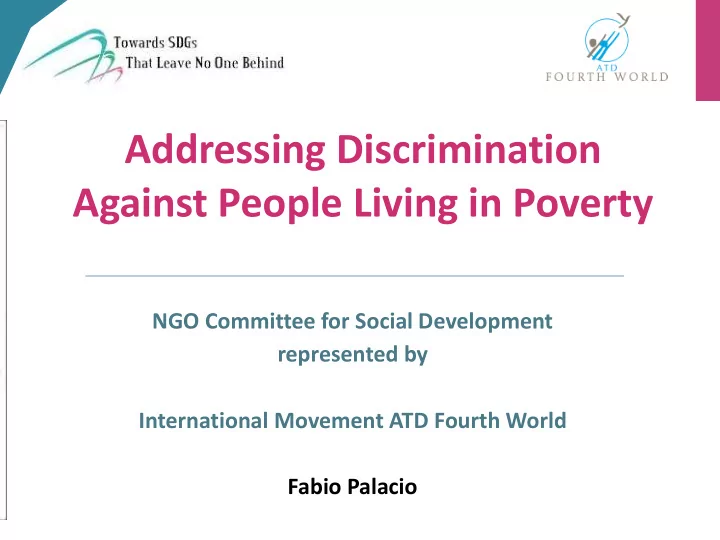

Addressing Discrimination Against People Living in Poverty NGO Committee for Social Development represented by International Movement ATD Fourth World Fabio Palacio
Redefining Extreme Poverty • Discrimination in the poverty discourse • Emphasis on: – Its multidimensional nature – Its dehumanizing effects – Its reproduction – Dis-empowerment
What is discrimination? • Note • An inherent violence of poverty • Serge Paugam and marginal poverty: – Stigmatized, unfit for the modern world – Whose opinions are not solicited because they are not worthwhile or it is to too complicated to make contact with them
“That people disrespect us by calling us names like ‘social case’, ‘bad mother’, ‘incapable’, ‘good for nothing’ demonstrates how they are judging us and do not know the reality we face. We experience the violence of being discriminated against, of not existing , not being part of the same world, not being treated like other human beings .” Person Living in Poverty, France
“Stigma supplies the world view for marginalization by ‘legitimizing’ the process of setting up and perpetuating an ― ‘us and them’ divide, and through the devaluation and dehumanization of those seen as being outside the ―us… Stigma gives rise not only to discrimination, but also to a range of other human rights violations, both of economic, social and cultural rights as well as civil and political rights, underscoring the indivisibility of all human rights .” -Catarina de Albuquerque, UN Special Rapporteur on the right to safe drinking water and sanitation
Dehumanization and legitimization of human rights violations are the most dis-empowering aspects of poverty.
Discrimination in Communities 2 key areas: 1. Preventing access to available resources and services 2. Silencing people and preventing their participation
“Why didn’t you shower you pig?” Person Living in Poverty, Bolivia
“Extreme poverty engenders a fear, a shame in people, doubts that stop them from expressing themselves when they should .” Person Living in Poverty, Madagascar
Answers...Finally! • 3 important recommendations for addressing discrimination, developed through consultations with people living in poverty – Trust building – Maximizing Participation – Effective partnerships
Trust Building • Take time to get to know the community, win its trust and make sure that the project reaches its most excluded and impoverished members – Livelihood project in the Philippines
Maximizing Participation • Involve people living in poverty in every stage of planning, implementation and evaluation of development projects – Sure We Can- Brooklyn, New York – “if you are fighting for the same goal, then what happens? You’ll use your wisdom and the others will use theirs… One learns from the other, one helping the other” Seminar Participant, Brazil
Effective Partnerships • Civil society, government, and people living in poverty can create robust partnerships that improve participation and counteract the process of discrimination – ATD Fourth World programs in Belgium facilitate the creation of spaces for people living in poverty to speak to legislative bodies. – caveat
Proposals for Inclusive Citizenship in Communities afflicted by Poverty • Registration at birth – “Enhance the focus on socially excluded children” • Help eliminate stigmatization and discrimination through government programs that produce: – Easily accessible information on human rights – Safe and transparent complaints procedures – Training and awareness raising for state officials as well as health, and education professionals
At the UN and Post 2015 • Re examine the indicators linked to extreme poverty. $1.25 a day should do longer be considered as a reliable global measure of extreme poverty • Align development targets and their implementation processes with human rights norms and standards using the UN Guiding Principles on Extreme Poverty and Human Rights
Post 2015 • Discrimination as a cross-cutting theme • Focus on the poorest 20% of the national population • More process-based Indicators: – Proportion of public service providers and administrative offices handling beneficiaries in a non-discriminatory manner – Proportion of education institutions teaching human rights and promoting understanding among population groups (e.g. income groups)
On behalf of the NGO Committee on Social Development and the International Movement ATD Fourth World: Thanks!
Recommend
More recommend